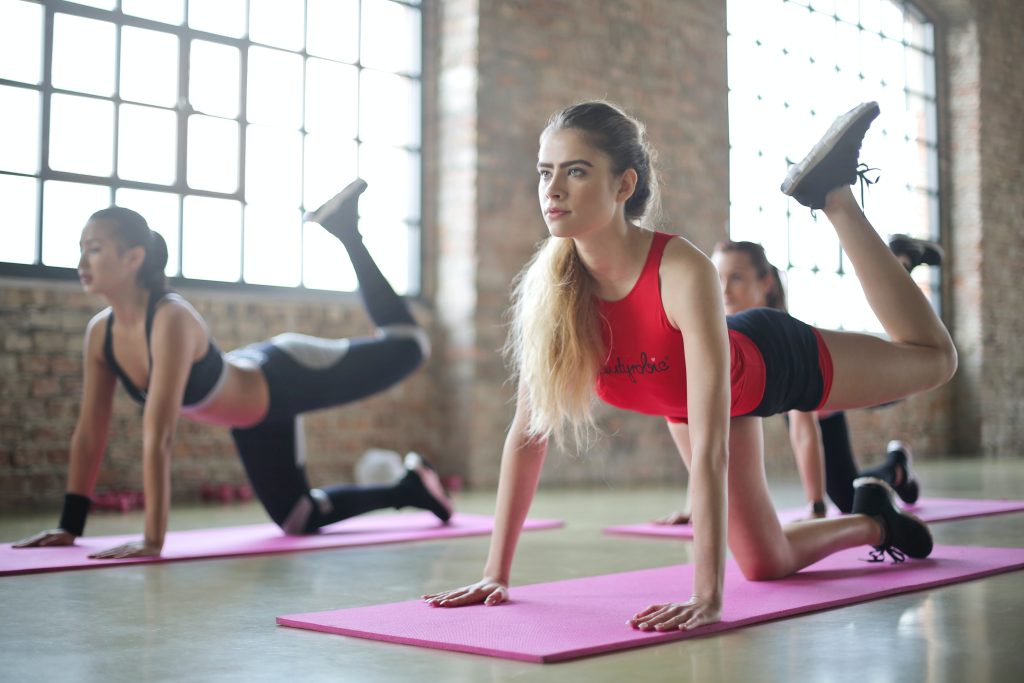- What is Hot Pilates? Hot Pilates is simply a class using Pilates principles in a warm room. Our hot yoga and Pilates classes at East of Eden is taught at 37 degrees, with 50%+ humidity. Some studios offer more classical Pilates in the heat, however you can also get a dynamic high intensity, low impact class called Inferno Hot Pilates. This a Pilates based HIIT class in the heat to increase the intensity and challenge – not for the faint hearted!
- How does it differ from other types of Pilates? Aside from the heat and humidity, and at East of Eden, the use of aromatherapy scents and coloured lights to enhance the experience, hot Pilates tends to be more dynamic, more focused on building strength and endurance, and more of a challenge.
- Why do you think we’ve seen a rise in this type of workout recently?Especially since it began trending on TikTok? We’ve seen a rise in popularity for classes and workouts that people can’t easily replicate at home, and hot Pilates definitely falls into this category. The heat offers something new to the more traditional mat Pilates classes, and people are often attracted to new and challenging workout routines that offer a more intense experience. The combination of Pilates with a hot and sweaty environment could be appealing to those looking for a different and exhilarating fitness experience. Plus there’s a rise in social media influencers on TikTok talking about hot Pilates, especially Inferno Hot Pilates – this will absolutely lead to a rise in popularity.
- What are the benefits of hot Pilates? Any additional benefits to what we see in traditional Pilates? If you are in a more traditional Pilates class in the heat, then you get all the benefits of a regular Pilates class, plus increased flexibility and an enhanced cardiovascular workout as a result of the heat. You might also detoxify through sweating more and improve your circulation. If you try Inferno Pilates, as well as these benefits, you’ll also improve your endurance and calorie burn, and your strength as you’ll use weights and resistance bands to get your muscles working.
- Some people find hot Pilates helps to reduce aches and pains, is there evidence for this? Moving your body regularly, and improving flexibility and circulation, plus stress reduction and better sleep from regular exercise, will help to reduce aches and pains. Pilates focuses on core strength and stability, and which can help improve posture and alleviate pressure on the back and spine, potentially reducing back pain. There isn’t any research that I know of specifically relating hot Pilates to reduced aches and pains, although anecdotally I would say it absolutely does, but I would always consult your doctor before starting a new exercise regime, especially if you are experiencing back pain, or recovering from injury.
- Some people report hot Pilates helps to boost metabolism, is there evidence for this? Hot Pilates is more physically demanding than traditional Pilates due to the higher intensity and the added challenge of exercising in heat. As a result, it may lead to increased caloric expenditure during the workout, and even afterwards, as your body continues to have an increased oxygen consumption even after you’ve finished the class.. When the body expends more calories than it consumes, it can contribute to weight loss and a temporary increase in metabolic rate.
- Some people suggest hot Pilates has helped them to lose weight, is there evidence for this? Weight loss is primarily influenced by what you eat – burning more calories than you consume. Exercise can increase energy expenditure which can contribute to weight loss when combined with a balanced diet, plus you’ll feel stronger and sleep better and have better self esteem if you move regularly and feel strong, but exercise itself won’t help you lose weight. As mentioned above, Hot Pilates, like any high-intensity exercise, can be an effective way to burn calories and the heated environment and intensity of the workout may lead to increased sweating, which could be perceived as immediate weight loss due to water loss. However, this initial weight reduction is temporary and related to fluid loss, not fat loss.
Credit: Abby Mclachlan, Founder of East of Eden
Featured Photo by bruce mars on Unsplash


